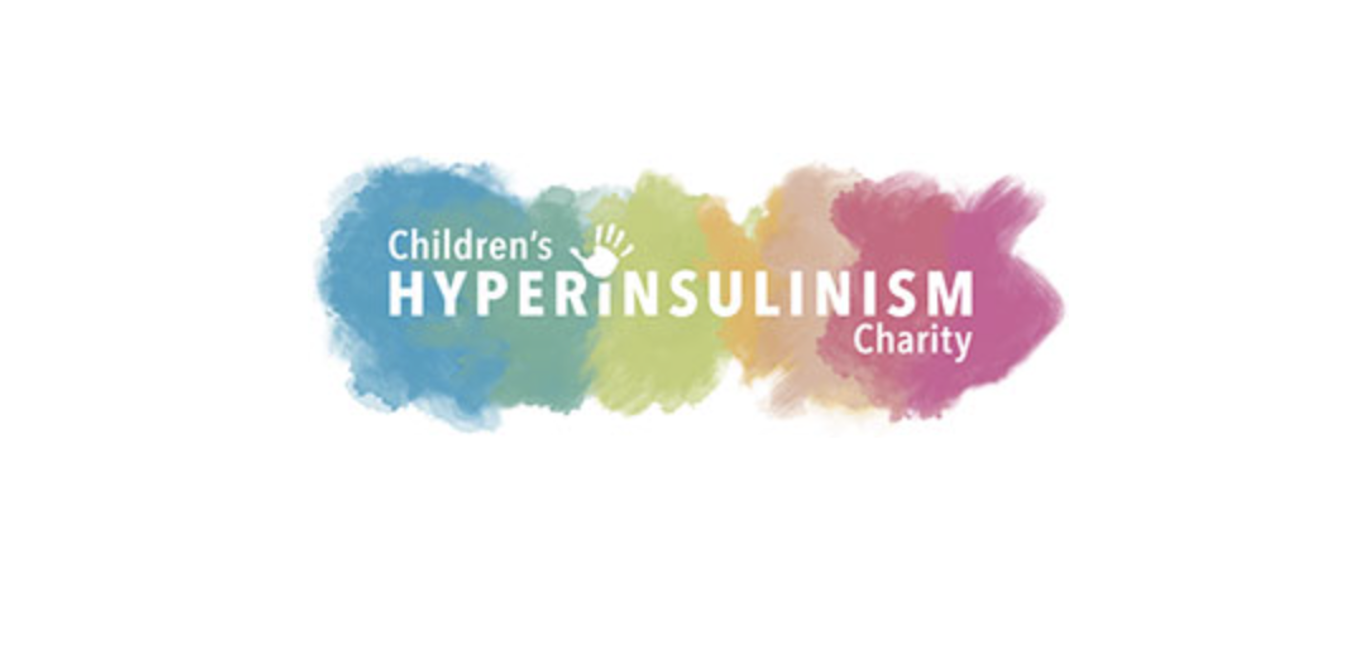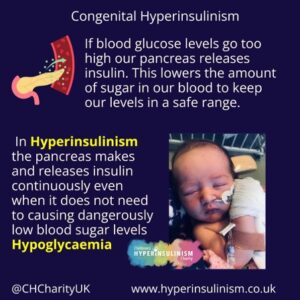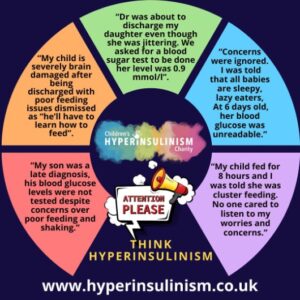
13th February 2025
Hyperinsulinism is the inappropriate and unregulated insulin secretion in relation to blood glucose concentration. It is the main cause of recurrent and persistent hypoglycaemia in infancy and childhood, and is a major cause of hypoglycaemic brain injury.
Normally, blood glucose levels are regulated by insulin secretion, however, in Hyperinsulinism, the beta-cells of the pancreas consistently release insulin inappropriately, causing low blood glucose levels (hypoglycaemia). The high levels of insulin prevent ketones being made and so the brain is starved of both its vital fuel glucose and prevented from using ketone bodies as alternative fuels. When the brain has no fuel, the child is at risk of seizures, loss of consciousness and even brain injury. Many children also suffer issues related to the management of the condition, such as fluid overload, cardiac and respiratory issues, infections, feeding issues, gastro-oesophageal reflux, and food intolerances or allergies.

The primary aim of this research is to develop a deeper understanding of the neurological consequences of hypoglycaemia on the developing brain. To our knowledge, no research has explored this in the context of Hyperinsulinism. It is estimated that 30–50% of children with Hyperinsulinism experience neurological consequences, yet there remains a significant gap in understanding the precise impact on the brain. This research aims to bridge that gap, providing clinicians and families with greater insight into the condition and identifying risk factors for more severe neurological outcomes.
A further objective is to reinforce the urgent need for early and accurate detection of hypoglycaemia. Many families report frustration at the widespread misconception that neonatal hypoglycaemia is not dangerous, with insufficient recognition of Hyperinsulinism as a potential underlying cause. As a result, families are often not listened to, leading to misdiagnosis, delayed diagnosis, and, in many cases, lifelong neurological consequences. If this research establishes a definitive link between hypoglycaemia and neurological impact, it will provide essential evidence to ensure healthcare professionals recognise the importance of considering Hyperinsulinism in infants with persistent hypoglycaemia.

This research will benefit babies, children, and young adults with Hyperinsulinism, providing crucial insights that will not only improve their own understanding of the condition but also inform future generations. For families, the findings will offer essential evidence and awareness, enabling them to better understand the associated risks and ensuring that any developmental delays are identified promptly. Early recognition and intervention have the potential to significantly improve outcomes and overall understanding within this population.
Many families report that their child’s assessments and diagnoses are conducted without adequate consideration of the impact of hypoglycaemia on brain development. This lack of awareness may contribute to misleading or inaccurate assessments, delaying the support children require. By addressing this gap, the research will help ensure that medical evaluations are informed by a more comprehensive understanding of the condition.
The NHS and medical professionals will also benefit from these findings. Hypoglycaemic brain injury cases result in significant financial costs to the NHS due to compensation claims, ongoing care, and therapy provision. A greater understanding of the neurological consequences of hypoglycaemia could lead to increased awareness, earlier detection, and more timely referrals, ultimately improving patient outcomes while reducing long-term healthcare costs.
Paediatric Neurologists with a specialist interest in hypoglycaemia. Developmental Paediatricians, Neonatologists, Paediatric Endocrinologists. We need expertise in understanding how hypoglycaemia may impact on the vulnerable and developing brain. Login and navigate to the member’s area to learn more about this research question!
Back to News